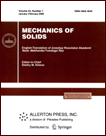 | | Mechanics of Solids
A Journal of Russian Academy of Sciences | | Founded
in January 1966
Issued 6 times a year
Print ISSN 0025-6544
Online ISSN 1934-7936 |
Archive of Issues
| Total articles in the database: | | 13427 |
| In Russian (Èçâ. ÐÀÍ. ÌÒÒ): | | 8178
|
| In English (Mech. Solids): | | 5249 |
|
| << Previous article | Volume 59, Issue 1 / 2024 | Next article >> |
| Hong Wang and Yongbin Ma, "Thermoelastic Response of an Infinite Hollow Cylinder under Fractional Order Dual-Phase-Lag Theory," Mech. Solids. 59 (1), 459-482 (2024) |
| Year |
2024 |
Volume |
59 |
Number |
1 |
Pages |
459-482 |
| DOI |
10.1134/S002565442360263X |
| Title |
Thermoelastic Response of an Infinite Hollow Cylinder under Fractional Order Dual-Phase-Lag Theory |
| Author(s) |
Hong Wang (Lanzhou University of Technology, Lanzhou, China; School of Science, Lanzhou University of Technology, Lanzhou, 730050 China, why949782432@126.com)
Yongbin Ma (Lanzhou University of Technology, Lanzhou, China; School of Science, Lanzhou University of Technology, Lanzhou, 730050 China, myb_ssy@lut.edu.cn) |
| Abstract |
With the application of tiny components in scientific research and daily life, heat conduction and structural shape change in solids have attracted the idea of researchers. So further refinement
of the theoretical model of thermo-viscoelastic hollow cylinders with fractional-order derivatives is the
fundamental purpose of this study and development of fractional-order thermoelasticity theory with
fractional-order strains to provide theoretical foundations for some thermodynamic practical applications (e.g., pipeline transport of gases or liquids) and selection of elastic and viscoelastic materials.
In this paper, the dynamic response of the inner and outer surfaces of an infinitely sizeable hollow cylinder under the action of thermal shock is examined based on the fractional-order two-phase hysteresis theory and viscoelasticity theory. Convective boundary conditions are imposed on the inner and
outer surfaces of the hollow cylinder and there is no traction on the inner and outer surfaces. The governing equations of the problem are established and solved by the Laplace transform method. In the
numerical calculations, firstly, the effects of viscoelastic parameters on heat transfer as well as the stability of material structure are examined; secondly, the effects of fractional-order strain parameters on
the model and their variations are examined; and finally, the effects brought about by the selection of
hysteresis factors are examined. The results show that the introduction of the fractional order strain
parameter has an important effect on the generalized thermoelastic model, and the viscoelastic
parameter has a significant effect on the physical field of the hollow cylinder, especially the displacement and stress. |
| Keywords |
fractional order dual-phase-lag, hollow cylinder, viscoelasticity, fractional order strain, convective boundary conditions |
| Received |
13 December 2023 | Revised |
01 March 2024 | Accepted |
10 March 2024 |
| Link to Fulltext |
|
| << Previous article | Volume 59, Issue 1 / 2024 | Next article >> |
|
 If you find a misprint on a webpage, please help us correct it promptly - just highlight and press Ctrl+Enter If you find a misprint on a webpage, please help us correct it promptly - just highlight and press Ctrl+Enter
|
|

 Russian
Russian  English
English